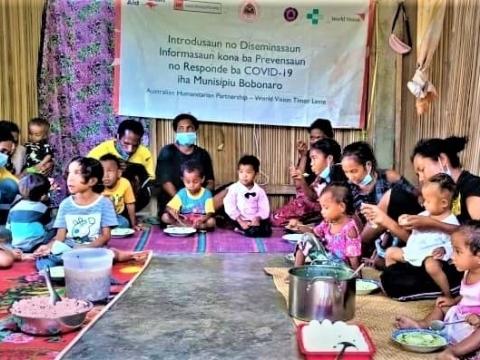Superfoods help sustain family life amid the pandemic and state of emergency

To respond to her concerns, she joined World Vision’s activity in 2020 by planting superfoods such as beans and sweet potatoes on her farm. “I just started planting superfood in my farm last year such as soy and mung beans, orange sweet potatoes and red beans. It gave us a good result. Earlier, I had no idea that planting them would benefit my family due to a lack of information. I also did not know that soybean can produce milk”, said Arminda surprised while sitting in her front yard.
Addressing Australian Humanitarian Partnership (AHP) COVID-19 Response project, with a fund from Australian Government – DFAT, World Vision collaborated with administrative-post, local authorities, and Family Health Promoter supported communities how to plant superfood properly and well prepared when a disaster occurs. This project aimed to reinforce communities’ awareness of COVID-19 prevention, increase economic incomes and combat Gender-Based Violence (GBV). The intervention is focused on vulnerable and malnutrition people and children through providing them information about growing superfood technically and creating demo cooking on how to process nutritious foods for daily consumption.
During the State of emergency declared by the government, Arminda and her family faced challenges such as lack of money due to cannot sell their crops to the market, and she was unable to grow her farm well because of climate change. However, she benefited from the project itself. As a result, she managed how to run her farm for survival. “My family and I struggled with finances, and we were unable to buy basic needs for my children such as milk, cookies and other foods. But, gaining skills and knowledge from world Vision in my village, my family and I can consume homemade milk produced from soybean and sweet potatoes which can be made into cookies depending on our tastes.” Olivio, 54, joined his wife Arminda on demo cooking. “My wife and I learnt how to cook nutritious foods for children and to breastfeeding mothers such as soap, porridge with moringa, soybean to milk, rice mixed with red beans and compote mung beans. We felt so happy because even this was new for us, but we gained experiences to fix our lifestyle consumed.” Explained Olivio.
World Vision also supported Arminda and other households, established handwashing facilities from traditional material and received information on protecting themselves from COVID-19. They also benefited by raising chickens and creating savings and loans in the village to increase their family income. As a result, Arminda and Olivio have raised 32 chickens during one year and consume eggs every day.
“6900 households from 4 villages have benefited from this project. During the observation, the communities followed the guidelines on growing superfoods and cooking foods from what they have planted from their own farms. They also though their children how to wash hands frequently to prevent them from the virus.” Said Amelia Matos, World Vision AHP COVID-19 project facilitator. The team also provided training on demo cooking skills to Family Health Promoter to continue implementing in their own villages.
Through this activity, World Vision ensures that communities can make changes by consuming nutritious food to increase their health, protect themselves from the virus by washing their hands properly and increase their income from saving and loan groups to respond to their needs if disaster hits.